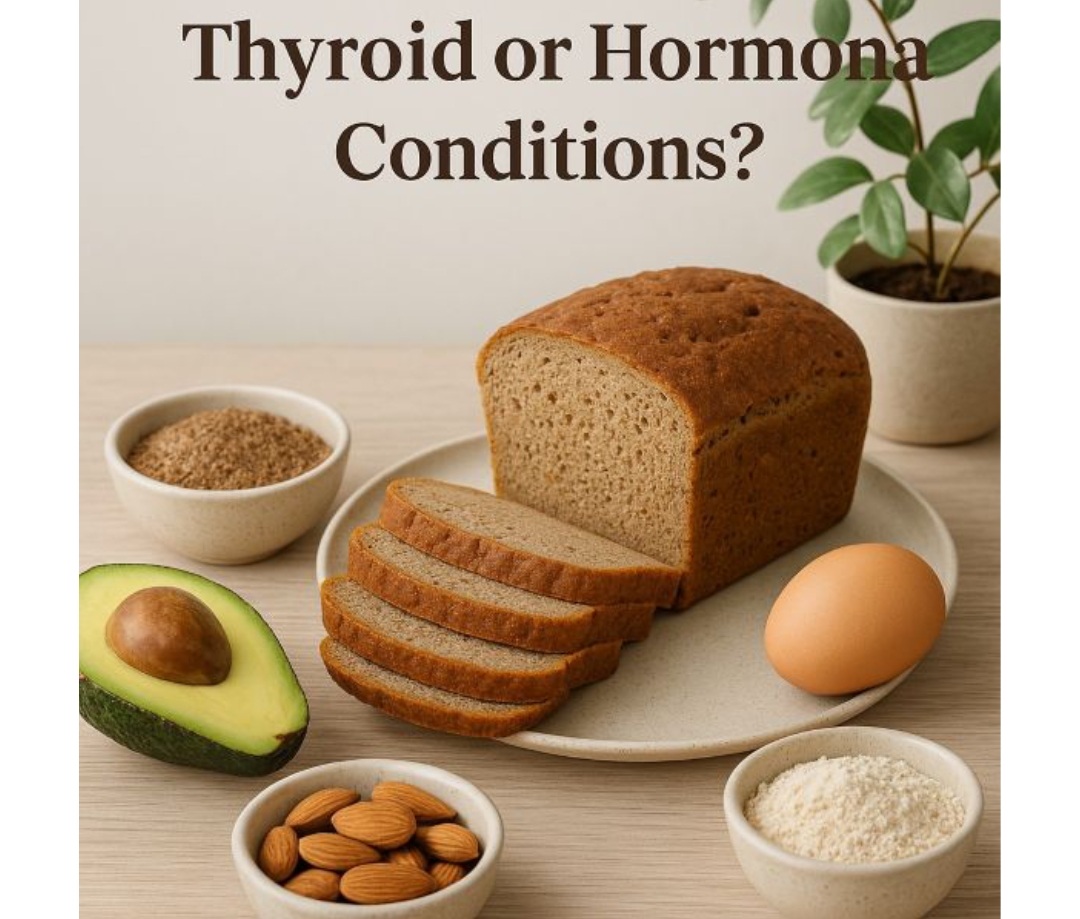For individuals living with thyroid issues or hormonal imbalances, every bite of food matters. From managing metabolism to regulating energy and mood, hormones play a crucial role in overall health. With more attention on functional foods, one trending question has emerged: Is protein bread suitable for people with thyroid or hormonal conditions?
Protein bread has been gaining traction among health-conscious consumers, particularly those following low-carb, high-protein, or fitness-oriented diets. But for individuals with conditions like hypothyroidism, Hashimoto’s thyroiditis, polycystic ovary syndrome (PCOS), or adrenal fatigue, not all foods are created equal.

In this article, we’ll examine the role of protein bread in thyroid and hormonal health, break down its ingredients, and provide insight into whether it’s a good choice for those with hormonal sensitivities. We’ll also explore how to choose the right kind of protein bread—and why Low Carb Avenue’s multigrain breads could be a great addition to a hormone-friendly diet.
What Is Protein Bread?
Protein bread is a type of bread specifically designed to be high in protein and lower in carbohydrates than traditional bread. It often includes ingredients like almond flour, flaxseed, oat fiber, psyllium husk, whey or pea protein, and vital wheat gluten.
Compared to regular bread, protein bread has a nutritional profile that supports muscle maintenance, blood sugar balance, and increased satiety. For people with thyroid or hormonal conditions, these benefits are especially appealing.
But the real answer to whether protein bread is suitable lies in the ingredients, the person’s specific condition, and how the bread fits into their overall dietary strategy.
Thyroid and Hormonal Health: Why Diet Matters
The thyroid gland plays a vital role in regulating metabolism, energy production, body temperature, and even digestion. When the thyroid is underactive (hypothyroidism) or overactive (hyperthyroidism), it disrupts hormone balance across the body. Similarly, conditions like PCOS, adrenal fatigue, or menopause also cause shifts in hormonal function that affect weight, mood, and digestion.
That’s why people with hormonal issues often turn to nutrition to regain balance. A diet rich in clean proteins, healthy fats, fiber, and low-glycemic carbohydrates can help manage symptoms. The question then becomes: does protein bread align with these dietary principles?
Benefits of Protein Bread for Hormonal Health
1. Stable Blood Sugar Levels
Hormonal health and blood sugar regulation go hand-in-hand. High-carb foods cause insulin spikes that can worsen symptoms of PCOS, hypothyroidism, and other hormone-related disorders. Most protein bread is low in net carbs and high in fiber, helping to maintain stable blood glucose levels—critical for anyone dealing with insulin resistance or hormonal imbalance.
2. High Protein Content for Metabolism
Protein supports thyroid function and boosts metabolism, both of which can be sluggish in hypothyroidism. By including protein bread in meals, individuals can boost their protein intake without needing to consume excessive animal products or protein shakes.
3. Hormone-Supportive Ingredients
Many protein bread varieties include hormone-friendly ingredients like flaxseed (rich in lignans), almond flour (loaded with vitamin E and magnesium), and oat fiber (good for gut health). These nutrients support hormone regulation and help detox excess estrogen from the body.
4. Better Satiety and Reduced Cravings
Hormonal conditions can increase appetite and cravings—particularly for sugar and processed carbs. The protein and fiber in protein bread help control appetite and provide a sense of fullness, making it easier to stay on track with balanced eating.
Considerations for Thyroid and Hormonal Conditions
While protein bread can be beneficial, there are a few considerations to keep in mind for those managing hormonal issues:
1. Gluten Sensitivity or Hashimoto’s
Hashimoto’s thyroiditis, an autoimmune form of hypothyroidism, is often associated with gluten sensitivity. Many protein bread recipes include vital wheat gluten, which may trigger inflammation in sensitive individuals. In this case, a gluten-free version of protein bread would be more appropriate.
2. Soy-Based Ingredients
Some protein breads use soy protein isolate, which can act as a phytoestrogen. While moderate soy intake is safe for most, those with estrogen-dominant conditions (like certain types of PCOS) may prefer to limit soy. Look for bread made with almond flour, whey, or pea protein instead.
3. Artificial Additives and Preservatives
People with hormonal issues often have heightened sensitivity to chemicals and food additives. Choosing bread with clean, whole ingredients is essential for minimizing endocrine disruption.
Ingredients to Look for in Hormone-Friendly Protein Bread
Not all protein breads are created equal. If you’re dealing with thyroid or hormonal issues, here are ingredients you should prioritize:
- Almond Flour – provides healthy fats, magnesium, and vitamin E
- Flaxseed – rich in omega-3s and hormone-balancing lignans
- Oat Fiber – high in fiber for digestive and blood sugar health
- Eggs – source of choline and complete protein
- Whey or Pea Protein – high bioavailability and supports muscle repair
- No added sugar – low glycemic impact is essential
- No artificial preservatives or flavors
Avoid protein bread with refined flours, hydrogenated oils, artificial sweeteners, or soy if you have known sensitivities.
How to Incorporate Protein Bread into a Hormone-Friendly Diet
1. As a High-Protein Breakfast Base
Start the day with protein bread topped with avocado and eggs for a blood sugar-stabilizing, hormone-supportive breakfast.
2. As a Midday Meal Anchor
Use protein bread to build a turkey and spinach sandwich with a smear of hummus or mustard for lunch. It satisfies cravings while delivering nutrients that support thyroid function.
3. In Low-Carb Meal Plans
For those on ketogenic or low-carb diets for hormonal balance (especially in PCOS), protein bread offers a great way to enjoy bread without the carb spike.
4. To Replace Processed Snacks
Instead of reaching for granola bars or crackers, a slice of protein bread with nut butter is more nourishing and filling.
Why Low Carb Avenue’s Multigrain Breads Are a Smart Choice
While marketed as multigrain rather than protein-specific, Low Carb Avenue’s multigrain breads check nearly every box for those managing thyroid and hormonal conditions. They’re made with almond flour, flaxseed, oat fiber, dark rye flour, and vital wheat gluten—providing a balance of plant-based protein, fiber, and healthy fats.
The ingredients are clean, minimally processed, and free from added sugars. This bread supports blood sugar regulation, metabolic health, and satiety—all key elements in a hormone-friendly lifestyle. Whether eaten as toast, part of a sandwich, or a quick on-the-go snack, it’s a versatile addition to any hormone-aware diet.
Frequently Asked Questions
Can protein bread help with hypothyroidism weight gain?
Yes, by increasing protein intake and stabilizing blood sugar, protein bread can support weight loss in individuals with underactive thyroids. Combined with regular activity and balanced meals, it helps curb cravings and control portion sizes.
Is protein bread safe for women with PCOS?
Absolutely—protein bread made with low-carb, hormone-friendly ingredients is ideal for women managing PCOS. It helps balance insulin, reduce cravings, and support lean muscle development.
What if I have adrenal fatigue?
If you struggle with energy crashes and adrenal imbalances, choose protein bread with whole ingredients, no stimulants, and moderate protein levels. It can help provide steady energy when paired with healthy fats and complex carbs.
How much protein bread should I eat per day?
This depends on your dietary needs, but 1–2 slices of protein bread as part of a balanced meal is generally effective. Monitor how your body responds and adjust as needed.
Final Thoughts: Is Protein Bread Right for Hormonal Health?
In most cases, yes—protein bread can be a smart, functional food for people managing thyroid or hormonal conditions. It supports metabolism, stabilizes blood sugar, increases satiety, and delivers essential nutrients that benefit hormone regulation.
That said, it’s essential to choose the right product. Look for clean-label, gluten-free or low-gluten options, with no soy or additives. For those seeking a trusted choice, Low Carb Avenue’s multigrain breads offer both protein and hormone-supportive ingredients in a delicious, low-carb format.
If you’re navigating hormone imbalances and seeking better energy, mood, and weight control, protein bread might be the real-food solution you’ve been looking for—one slice at a time.




























